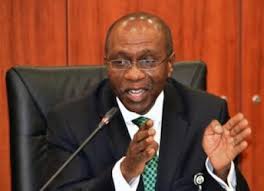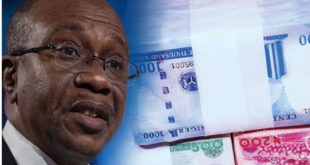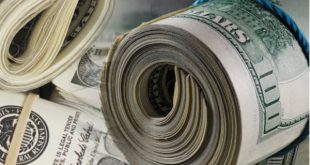
The Central Bank of Nigeria (CBN) Governor, Mr. Godwin Emefiele, wednesday revealed that the country’s external reserves had risen to $31.89 billion as at July 7, 2015.
Emefiele attributed this to strong efforts of President Muhammadu Buhari to plug all leakages, as well as the vigilant demand management of the central bank. He said the development was very gratifying.

The CBN governor disclosed this in his opening remarks at the briefing of the Senate President and the Leadership of the Senate on the Nigerian economy in Abuja.
According to him, recent measures by the central bank would help reposition the economy for the next phase of growth and development.

Emefiele listed these measures to include among others, the further tightening of monetary policy; closure of the official foreign exchange window; review of operators’ Net Open Position (NOP); placement of 72-hour limit on FX utilisation; and ban on selected items from access to foreign exchange in either the interbank or BDC markets.

“These policies have led to a significant stabilisation in the exchange rate and an improvement in market sentiments. Having earlier traded at as high as N206/$1, the naira-dollar exchange rate has appreciated and remained around N197/$1 in the interbank market in the past five months.
“Going forward, the CBN would continue to be vigilant in the market to ensure that there is zero tolerance for speculators. Nigeria’s foreign reserves remain our common wealth and we must all strive to work together to protect it and prevent speculators and rent seekers from plundering it. We would continue to find ways to rebuild our external reserves and where possible, accelerate efforts aimed at improving aggregate supply potentials of the economy,” he added.
He noted that the global economy had experienced three major shocks in the last one year. These developments he listed to include: the significant and seemingly permanent fall in the price of crude oil, Nigeria’s main revenue earner; the end of the Quantitative Easing Programme of the Federal Reserve Bank of the United States; and the continued US-led sanctions on Russia for its alleged role in the ongoing crisis in Ukraine.
“Reflecting the sharp fall in oil prices and speculative foreign exchange activities, external reserves declined from $37.3 billion in June 2014 to $29.1 billion as at the end of June 2015. Given our understanding that the fall in oil prices may not be transitory but permanent, and that some speculative activities were going on in the forex market, the CBN took a number of proactive countervailing actions,” he explained.
Continuing, the CBN boss said: “At the heart of the issues that currently confront our nation is the need for us to diversify the structure of our economy from being import dependent to being an economy that produces what she consumes. According to one of Africa’s foremost industrialist, our very own Alhaji Aliko Dangote, we must stop exporting jobs to other countries and importing poverty to our land by producing and consuming locally made goods.
“As we speak today, hundreds of thousands of locally produced paddy rice litter Nigeria’s rice belts unsold. Our rice farmers are today sinking deeper into poverty due to our preference for imported rice even though the local ones are now of about the same or even better quality. We therefore seize this opportunity to appeal to our rice importers to support local farmers by patronising our home grown rice.
“It is now time for us work together to resuscitate our moribund textile industries, begin to grow and consume our rice, and rejuvenate our abandoned palm plantations in the mid and south eastern parts of the country and a host of other industries that once helped in creating job opportunities for our people.”
He pointed out that the central bank had been at the forefront, acting as a catalyst to job creation and inclusive growth since 1978 through its various interventions in various/targeted sectors of the economy, pledging that the institution would remain committed to the course because it believes it is the right direction that will help in conserving the reserves, achieve a stable exchange rate and create jobs.
 MMS PLUS NG – Maritime, Aviation, Business, Oil and Gas News Online Newspaper with coverage in Maritime, Oil and Gas, Aviation, Power and Energy as well as Financial News
MMS PLUS NG – Maritime, Aviation, Business, Oil and Gas News Online Newspaper with coverage in Maritime, Oil and Gas, Aviation, Power and Energy as well as Financial News









